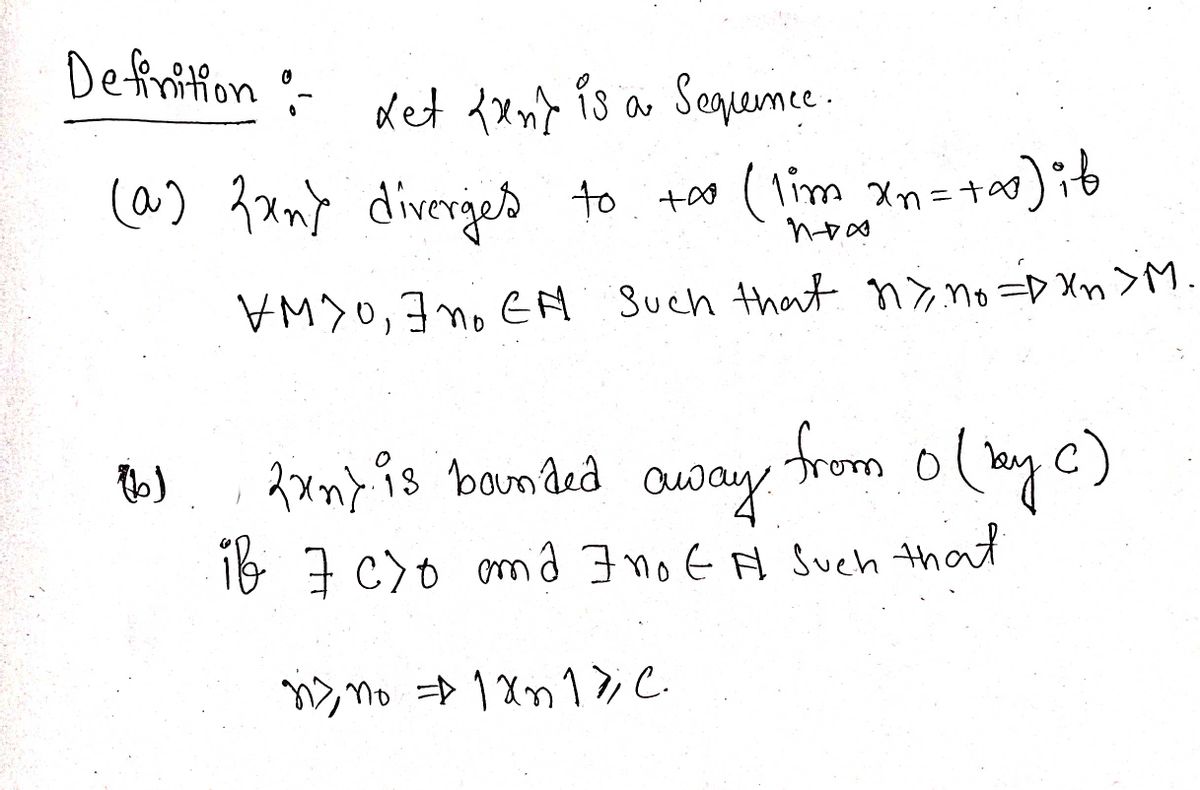Prove directly from the definitions that if an → +∞o and {bn} is a se- quence of positive terms bounded away from 0, then anbn → +∞.
Prove directly from the definitions that if an → +∞o and {bn} is a se- quence of positive terms bounded away from 0, then anbn → +∞.
Advanced Engineering Mathematics
10th Edition
ISBN:9780470458365
Author:Erwin Kreyszig
Publisher:Erwin Kreyszig
Chapter2: Second-order Linear Odes
Section: Chapter Questions
Problem 1RQ
Related questions
Question
![### Problem Statement:
1. **Prove directly from the definitions that if \( a_n \to +\infty \) and \(\{ b_n \} \) is a sequence of positive terms bounded away from 0, then \( a_n b_n \to +\infty \).**
2. **Let \( c \in \mathbb{R} \) and \( p \in \mathbb{N} \) be fixed. Prove that:**
*[The rest of this statement is missing from the image.]*
### Explanation:
- **Definitions:**
- **\( a_n \to +\infty \):** This means that the sequence \(\{ a_n \}\) grows without bound. For any large number \( M \), there exists an integer \( N \) such that for all \( n \geq N \), \( a_n > M \).
- **Sequence bounded away from 0:** A sequence \(\{ b_n \}\) is bounded away from 0 if there exists a positive number \( m > 0 \) such that \( b_n \geq m \) for all \( n \).
- **Objective:**
- For sequences \( \{ a_n \} \) and \( \{ b_n \} \), show that their product \( a_n b_n \) also tends to infinity.
No graphs or diagrams are present in this image.](/v2/_next/image?url=https%3A%2F%2Fcontent.bartleby.com%2Fqna-images%2Fquestion%2F12d7a631-2def-4446-884f-1051f3f97f00%2Fea8913a8-f4c9-40cc-9d73-b4a67add7e41%2Fcas35x_processed.jpeg&w=3840&q=75)
Transcribed Image Text:### Problem Statement:
1. **Prove directly from the definitions that if \( a_n \to +\infty \) and \(\{ b_n \} \) is a sequence of positive terms bounded away from 0, then \( a_n b_n \to +\infty \).**
2. **Let \( c \in \mathbb{R} \) and \( p \in \mathbb{N} \) be fixed. Prove that:**
*[The rest of this statement is missing from the image.]*
### Explanation:
- **Definitions:**
- **\( a_n \to +\infty \):** This means that the sequence \(\{ a_n \}\) grows without bound. For any large number \( M \), there exists an integer \( N \) such that for all \( n \geq N \), \( a_n > M \).
- **Sequence bounded away from 0:** A sequence \(\{ b_n \}\) is bounded away from 0 if there exists a positive number \( m > 0 \) such that \( b_n \geq m \) for all \( n \).
- **Objective:**
- For sequences \( \{ a_n \} \) and \( \{ b_n \} \), show that their product \( a_n b_n \) also tends to infinity.
No graphs or diagrams are present in this image.
Expert Solution
Step 1

Step by step
Solved in 2 steps with 2 images

Recommended textbooks for you

Advanced Engineering Mathematics
Advanced Math
ISBN:
9780470458365
Author:
Erwin Kreyszig
Publisher:
Wiley, John & Sons, Incorporated

Numerical Methods for Engineers
Advanced Math
ISBN:
9780073397924
Author:
Steven C. Chapra Dr., Raymond P. Canale
Publisher:
McGraw-Hill Education

Introductory Mathematics for Engineering Applicat…
Advanced Math
ISBN:
9781118141809
Author:
Nathan Klingbeil
Publisher:
WILEY

Advanced Engineering Mathematics
Advanced Math
ISBN:
9780470458365
Author:
Erwin Kreyszig
Publisher:
Wiley, John & Sons, Incorporated

Numerical Methods for Engineers
Advanced Math
ISBN:
9780073397924
Author:
Steven C. Chapra Dr., Raymond P. Canale
Publisher:
McGraw-Hill Education

Introductory Mathematics for Engineering Applicat…
Advanced Math
ISBN:
9781118141809
Author:
Nathan Klingbeil
Publisher:
WILEY

Mathematics For Machine Technology
Advanced Math
ISBN:
9781337798310
Author:
Peterson, John.
Publisher:
Cengage Learning,

